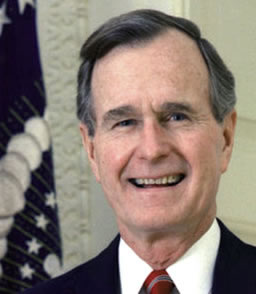Early Years
Bush was born in Milton, Massachusetts, on June 12, 1924. His father was a Wall Street banker and the founder of a highly successful oil company. George attended the prestigious Andover Academy as a teenager. Although George was accepted to Yale University, he deferred his admission and served as the youngest aviator in American history (to that date) during World War II. He attended Yale after the war and graduated in two and a half years. Bush was an excellent baseball player at Yale and played in two College World Series. In 1945, he married Barbara Pierce. For the next nineteen years, he prospered in the Texas oil industry and became a millionaire.
Political Career and Eight-hour Presidential Term
Bush entered politics in 1964. In 1966, he became a representative in Congress from Texas. In 1970, after being defeated in a bid for the Senate, President Richard Nixon appointed him as ambassador to the United Nations. In 1980, he was appointed by President Gerald R. Ford as the Director of the Central Intelligence Agency (CIA), a position in which he served for about a year. Today, the CIA headquarters are named for him. Bush ran for president in 1980 on the Republican ticket but did not win; instead, he was chosen as a running mate for Ronald Reagan. He served two terms as vice president to Ronald Reagan. Bush served as president during this time for eight hours while Reagan had cancer surgery. He worked mainly on deregulation and the war on drugs.
41st President
In 1988, he was elected the 41st president. His presidency came at a time of major political upheaval abroad as the Soviet Union and Berlin Wall fell. In January of 1991, he authorized the Persian Gulf War after Iraq invaded its neighbor to the south, Kuwait. Urged by the King of Saudi Arabia, who feared Iraq might invade his country, US military forces quickly dispatched of Iraqi forces in Kuwait after a combined land and air attack. Despite a lack of international support for the military measures, the attack made him very popular in the United States, though many believed the attacks should have resulted in an overthrow of Iraqi dictator Saddam Hussein and his government. In 1991, Bush met with Mikhail Gorbachev, leader of the Soviet Union, and signed an arms reduction treaty which reduced each country’s supply of nuclear arms by 35 percent and the Soviet Union’s land-based intercontinental ballistic missiles by 50 percent. This treaty was viewed as a breakthrough in relations between the United States and the Soviet Union.
NAFTA
Bush also spearheaded the effort for the North American Free Trade Agreement (NAFTA), which eliminated trade tariffs between the United States, Canada, and Mexico, enabling increased trade between the three nations. Many criticized this treaty because of the potential loss of US jobs as companies could now hire cheaper labor from other countries (specifically Mexico). The legislation was finally approved in 1993 during the Clinton administration.
Defeat
In 1993, he was defeated in his bid for reelection by Bill Clinton. Problems with the economy and increased taxes led to a steep decline in his approval rating. which ultimately contributed to this defeat. Bush is the father of the 43rd president, George W. Bush.












































